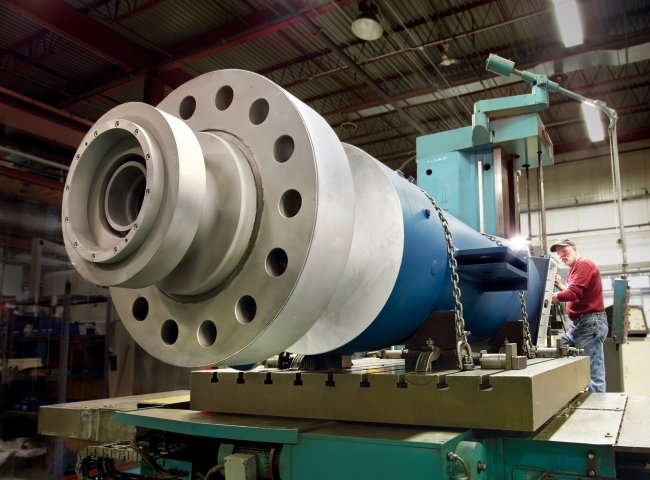3 minute read
UK supply chain targets the nuclear SMR market
Pump and motor manufacturer Hayward Tyler is working with the Nuclear Advanced Manufacturing Research Centre to develop a new coolant pump for small modular reactors (SMRs), and help the UK supply chain prepare to produce critical components for the global SMR market.
The government-funded project will focus on developing a class-leading reactor coolant pump, and aims to strengthen the UK supply chain to provide long-term growth opportunities for the production of nuclear components. The project will involve extensive research into suitable materials for construction, focusing on low-cobalt alloys from UK suppliers.
The collaborative project brings together Hayward Tyler’s manufacturing experience with the Nuclear AMRC’s innovation expertise. One of the world’s leading suppliers of electric motors and pumps, Luton-based Hayward Tyler has over 1000 pumps in active service in nuclear plants across the globe.

Hayward Tyler is working with the Nuclear Advanced Manufacturing Research Centre to develop a new coolant pump for small modular reactors / Picture: Hayward Tyler
Sam Ferguson, technical director at Hayward Tyler, said: “The main challenge facing Hayward Tyler in the design of reactor coolant pumps for SMRs is the high flow and head requirements of the application, coupled with the specific quality requirements of radiation-exposed equipment in the nuclear industry. Hayward Tyler’s rich history of designing class leading motors and pumps will enable us to be successful in the emerging UK SMR market.”
SMRs are advanced power plants that can be largely built in factories as modules to minimise costly on-site construction, and which allow manufacturers to reduce costs by producing many identical units. More than 70 designs of small modular reactor are in development in 18 countries around the world, mostly based on Gen III+ reactor technologies which are relatively close to commercial readiness.
Dr Evgeny Polyakov, sales director at Hayward Tyler, added: “The size of the SMR market is significant in the UK and globally. Although there are different types of SMRs being developed by major players, water-cooled reactors remain very attractive and bring a new dimension to the more reliable, clean and affordable nuclear power.”
Nuclear AMRC engineers will work with Hayward Tyler on design for manufacture, to make sure that components and assemblies offer optimal performance and can be efficiently produced to the quality standards demanded by nuclear customers. The team will also provide technical support on material selection, and help develop the UK supply chain for the new pumps.
Pumps for the reactor coolant system will primarily be made from low and zero-cobalt metal alloys which have minimal risk of suffering radiation-induced corrosion. Very few UK manufacturers have experience of working with these alloys, so the project will draw on the Nuclear AMRC’s detailed knowledge of the UK supply chain to identify potential suppliers and help them prepare for new opportunities in the SMR market.
Neil Murray, Nuclear AMRC business development manager for the advanced reactor market, said: “New designs of small and advanced modular reactor offers huge opportunities for the UK supply chain. These innovative reactors are smaller than the current generation of nuclear power plant, and their manufacture will most likely not be constrained by the same codes and standards as the current fleet of reactor plants. All their components and modules are being designed to be produced within factories, using advanced manufacturing techniques similar to those used in other sectors such as aerospace. That means that they’re a much better fit for the capabilities of the UK supply chain.
“By getting involved with the design of key components and assemblies at an early stage, we can not only ensure that they can be made as efficiently as possible, but also that UK companies are able to produce them for the global market.”
By addressing the manufacturing challenges of the new pump design, the project will also demonstrate a product development process and develop new understanding of low-cobalt alloys which can be applied to other safety-critical components for new nuclear plant. The knowledge developed during the project can then help UK suppliers to prepare for other opportunities in future reactor designs.